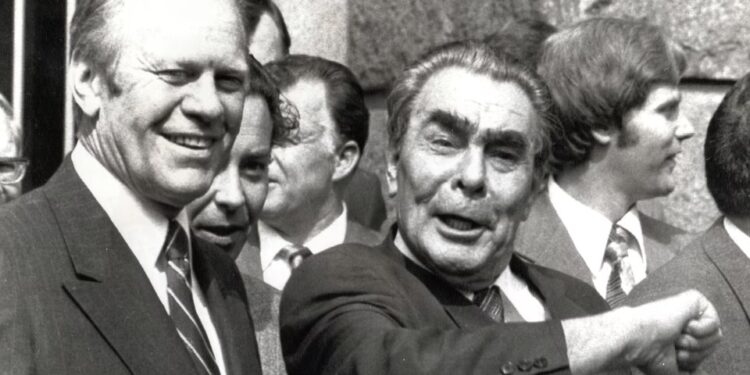Leonid Brezhnev led the Soviet Union for nearly two decades, overseeing a period of political stability and global influence but also of economic stagnation and ideological rigidity. When he assumed power in 1964 after Nikita Khrushchev’s ousting, Brezhnev promised steady leadership and a restoration of order following years of reform and uncertainty. His rule would come to symbolise both the Soviet Union’s peak as a superpower and the decline that ultimately led to its collapse.
Rise through the ranks
Born in 1906 in Dniprodzerzhynsk, now in Ukraine, Brezhnev was the son of a steelworker and a product of the Soviet industrial system. He joined the Communist Party in 1931 and rose quickly through its hierarchy, benefiting from the post-war expansion of Soviet bureaucracy. His loyalty and cautious pragmatism earned him the trust of Khrushchev, under whom he held several key regional and defence posts before joining the Politburo in 1957.
Consolidation of power
Brezhnev became General Secretary of the Communist Party in 1964, sharing power at first with Premier Alexei Kosygin. Over time, however, Brezhnev consolidated his authority, sidelining rivals and creating a stable but rigid leadership structure. His era was marked by a collective leadership style on paper, but in practice, Brezhnev became the unquestioned centre of power, favouring consensus and continuity over bold reform.
Foreign policy and détente
On the international stage, Brezhnev presided over a period of détente with the West, particularly the United States. The 1970s saw the signing of major arms control agreements such as the Strategic Arms Limitation Talks (SALT I) and the Helsinki Accords, which eased Cold War tensions. Yet this period of cooperation coexisted with assertive Soviet actions abroad — from the invasion of Czechoslovakia in 1968 to the disastrous intervention in Afghanistan in 1979. These moves reinforced Soviet global presence but strained the economy and international reputation.
Domestic stagnation
At home, Brezhnev’s years were marked by social stability and modest living standards, but also by mounting inefficiency. Economic growth slowed dramatically as the centrally planned system failed to innovate. The leadership relied heavily on oil and gas exports to sustain the state budget, while corruption, bureaucracy, and complacency took root. Brezhnev’s resistance to reform, combined with his advancing age and declining health, left the Soviet Union ill-prepared for the challenges of the 1980s.
Legacy of stability and decline
By the time of his death in 1982, Brezhnev had become a symbol of an ageing and immovable system. To many Soviet citizens, his rule was a time of relative peace and predictability — pensions were paid, housing was built, and the country’s superpower status was unquestioned. Yet historians largely agree that the “Brezhnev era” entrenched the stagnation that would later make radical reforms under Mikhail Gorbachev unavoidable.
Newshub Editorial in Europe – 10 November 2025




Recent Comments